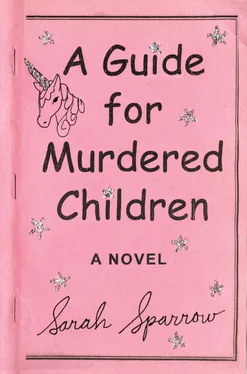Sarah Sparrow - A Guide for Murdered Children
Здесь есть возможность читать онлайн «Sarah Sparrow - A Guide for Murdered Children» весь текст электронной книги совершенно бесплатно (целиком полную версию без сокращений). В некоторых случаях можно слушать аудио, скачать через торрент в формате fb2 и присутствует краткое содержание. Город: New York, Год выпуска: 2018, ISBN: 2018, Издательство: Blue Rider Press, Жанр: Фэнтези, Триллер, Детектив, на английском языке. Описание произведения, (предисловие) а так же отзывы посетителей доступны на портале библиотеки ЛибКат.
- Название:A Guide for Murdered Children
- Автор:
- Издательство:Blue Rider Press
- Жанр:
- Год:2018
- Город:New York
- ISBN:978-0-399-57452-8
- Рейтинг книги:5 / 5. Голосов: 1
-
Избранное:Добавить в избранное
- Отзывы:
-
Ваша оценка:
- 100
- 1
- 2
- 3
- 4
- 5
A Guide for Murdered Children: краткое содержание, описание и аннотация
Предлагаем к чтению аннотацию, описание, краткое содержание или предисловие (зависит от того, что написал сам автор книги «A Guide for Murdered Children»). Если вы не нашли необходимую информацию о книге — напишите в комментариях, мы постараемся отыскать её.
A Guide for Murdered Children — читать онлайн бесплатно полную книгу (весь текст) целиком
Ниже представлен текст книги, разбитый по страницам. Система сохранения места последней прочитанной страницы, позволяет с удобством читать онлайн бесплатно книгу «A Guide for Murdered Children», без необходимости каждый раз заново искать на чём Вы остановились. Поставьте закладку, и сможете в любой момент перейти на страницу, на которой закончили чтение.
Интервал:
Закладка:
She lived in an SRO on Detroit’s Skid Row, beloved and protected by its denizens, many of whom called her Mother. She dispensed money when she could, bandaged and cleaned wounds after brawls and drunken falls, assuaged the despair of what had been irretrievably lost. They brought Annie small, heartfelt gifts and wrote poems to her singing her praises. She shaved her head like a monk; two decades ago, the hair had vanished during chemo but she stayed with the look. The cancer hadn’t recurred but she knew it would one day.
She knew things.
Sixteen years ago, when she presided over her first Meeting, there was only one group a week. The Guide wasn’t even printed — it was passed down by oral tradition. Back then, rules and regulations were spoken out loud to guests, who were asked to memorize what they heard. It was done that way because Annie’s mentor and supervisors were concerned there might be “problems” should the Guide s accidentally fall into the hands of those not meant to see them. But she cleverly found a way around that because she thought it was important that her guests had something on paper to refer to, a resource they could turn to in moments of anxiety. She told her mentor that to outside eyes, the Guide s’ cryptic content could easily be explained as “jottings” or samples of creative writing. Works-in-progress. Snippets of speculative fiction.
But now she had no overseers, no mentor or supervisors. They’d all vanished as subtly as they had long ago appeared.
She always felt when new children were coming. The sound of the train would grow louder but less whoosh- y. And then it just happened: she found herself on board, walking down long, dark corridors carrying trays of hot tea (the very same flavor she brewed in her tiny rented room) or lemonade, milk and cookies and brownies, all sorts of sugary whatnots. That was how Annie greeted each new arrival, and the ritual always touched her heart. Their blueness appeared to her in the form of jewelry: necklaces, earrings and rings, sometimes tiaras and crowns of cerulean. She never wanted to know what had happened to them—the specific horrors that brought them to this long ride through nothingness—no, that was anathema. Such information wasn’t hers to possess. She was merely happy to serve drinks and cookies and solace, and direct them where to go after the train pulled into the station.
She used to be a schoolteacher, but that was so many years ago. They fired her when she began hearing voices. She wound up in Ann Arbor at a psychiatric hospital called Swarthmore. She had already twice tried to kill herself when a scholarly-looking fellow began to visit. He told the authorities that he ran a halfway house for schizophrenic women in Detroit. His name was Jasper. He was a presentable, reputable man with a nattily manicured white goatee. Over the months, making the forty-five-minute drive from Detroit three times a week, he won Annie’s trust. He went to court and eventually secured her release to his care. He drew her back to this world by tenderly and methodically telling her about the other , the one the trains came from. He told Annie that she was a lot like him, they shared much in common—and that people like them were rare and highly sought after in his line of work. She asked, “What line of work is that?” He said that he was a “Porter” (when he wrote the word, it was always capitalized), and in time she came to know what he meant.
He taught her everything. She loved him like a father. Not long after she joined him, Jasper got sick and she cared for him until he passed. When he died he had no possessions, excepting his leather satchel and a beautiful antique cabinet of dark wood that was filigreed in mother-of-pearl, a parting gift from the Porter—a woman—who had mentored him.
He gave both to Annie and it felt like he had given her his heart.
She usually took the bus a good two hours before the Meeting, to be safe. Jasper taught her that being late was a sin. Besides, she needed to pick up Bumble. He didn’t have a driver’s license and liked to ride with her.
She wasn’t training him to be a Porter because that just wasn’t how it went. Being a Porter was a matter of destiny, not schooling. Yet all Porters needed what Jasper called “sentries,” to assist during Meetings. He taught her that the best sentries were the “backward” ones, those who were blunted or socially inept, and indeed, Bumble was a brilliant young man afflicted with Asperger’s. Though Jasper did become Annie’s helper for a time when he got too sick to be a Porter. She suspected he had an ulterior motive, wishing to lend his support through that first critical month when she essentially ran the Meeting by herself. He also told Annie that sometimes sentries were Porters who’d gone mad, having crumbled under the pressure of their duties, but that was a rarity.
The sentries stood at the door to make sure only invited guests attended. Because the Meetings took place in a church—the churches were under the belief they were being rented out for 12-Step meetings—outsiders occasionally wandered in, thinking it was AA or Al-Anon. But once all of the children from the train arrived, Bumble locked the doors. The Meetings lasted ninety minutes. At each, there were usually five or six “landlords,” Annie’s word for the ones whose moribund bodies housed the children who had returned. (The Porter encouraged them to think of the child-tenants as “roommates.”) It took a moment for the landlords to even find their way to the Meeting, because the absorption of the train kids was disruptive, to say the least—as if being resurrected from the dead hadn’t been disruptive enough. For a week or so, both children and hosts were severely disoriented and depressed, not only clobbered by the bizarreness of whatever it was that had happened to them but also struggling to adapt to having two sets of memories; they’d become little ones and grown-ups all at once. Ultimately, it was the child who would dominate, while drawing on the energy, intellect and experience of the landlord in whom they resided.
Annie could feel that she wasn’t long for this world and knew as well she would not be traveling to the other. To journey at life’s end to the place the trains came from was a privilege afforded only to the most powerful of Porters, and while she’d done well in her vocation, Annie never believed she was that special. No, she would die here, in this world, like her mentor. She had been a Porter far longer than any she’d heard of, longer than was meant to be. She had such knowledge from whispers overheard in the long, dark corridors of the Pullman cars while she carried trays to the cabins of her guests. She eavesdropped on other Porters, old and new, as they congregated in the locomotive’s nooks and niches, discussing her longevity in a respectful hush. They stepped back in obeisance, even awe, as she swept by with her tray of treats on the way to greet a new child… and she was an anomaly. Porter work wasn’t amenable to a long life; it took too much. Yet somehow, by fate or physical constitution, she had persevered.
There was much she would never know. How many Meetings were taking place throughout the city, the country, the world? How did it all begin? And what did any of it mean? (The impossible question of impossible questions.) Not since she was a young girl who awakened one morning with a shock of apprehension that everything was a dream had Annie doubted that life (and death) could hold such mysteries. Still another unanswerable question haunted and persisted: Why would Mystery be used to such vengeful ends? Yet through the years, Annie’s curiosities had ended, the leave-taking perhaps another mystery in itself. All she was certain of, all she had, was Love. She’d even begun to love the murderers—hadn’t they brought her all the beautiful children? But she suppressed the heretical feeling whenever it arose, suspecting it might cause harm to her innocent wards.
Читать дальшеИнтервал:
Закладка:
Похожие книги на «A Guide for Murdered Children»
Представляем Вашему вниманию похожие книги на «A Guide for Murdered Children» списком для выбора. Мы отобрали схожую по названию и смыслу литературу в надежде предоставить читателям больше вариантов отыскать новые, интересные, ещё непрочитанные произведения.
Обсуждение, отзывы о книге «A Guide for Murdered Children» и просто собственные мнения читателей. Оставьте ваши комментарии, напишите, что Вы думаете о произведении, его смысле или главных героях. Укажите что конкретно понравилось, а что нет, и почему Вы так считаете.












